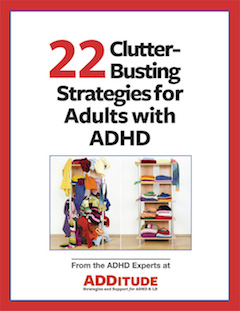Every issue of ADDitude features articles by experts giving their best advice for managing ADHD challenges. Their tips and strategies have changed many lives for the better. But everyone diagnosed with ADHD has his own set of challenges and favorite ways to meet them, based on circumstances, personality, and the severity of symptoms.
Many adults and parents who live with ADHD use strategies that they’ve devised themselves, modified, and refined. These tips don’t appear in articles about ADHD, but they work beautifully. (One tip that will help any ADHD adult get up on time in the morning, for instance, is setting your coffeemaker to brew at 7 A.M. — and removing the pot. If you don’t get up, you will have a kitchen counter covered in java.)
What works for you may not work for someone else. So we compiled a wide range of tips, from our readers and the ADDitude community, for handling the challenges that ADHD adults and parents face every day. The tips worked for them, and they might work for you.
FOR ADULTS
Best Tips For Disorganization
> I invite people over for dinner or a visit, so I have to clean up to get ready for them.
> I carry a colorful wallet, so I can find it quickly in my handbag.
> A few times a year, I get a clutter companion to help me sort clutter into four piles: “keep,” “toss,” “donate,” and “age.” I revisit the “age” items three months later, and make a decision then.
> I create a document “hot spot” for time-sensitive documents. I place up to five papers there, each representing a different task that needs to be attended to within the next 24 hours.
> I stay organized by hanging a list of tasks to do on the inside of my front door. I see it several times a day, including every time I leave the apartment.
> I attach electronic fobs to my keys and other important items. I press a button on the base unit and follow the beeps to my keys.
> I keep a small plastic baggie in my purse for receipts and another in the glove compartment of my car.
> I store items that are used together near each other, so I don’t have to run around to get the things I need to do a job. I keep wrapping paper, tape, scissors, and ribbons in the same closet.
> I clean up in stages. I’ll dust everything one day, clean the sink and toilet while my daughter is in the bath, and vacuum all the rooms on another day.
> I turn on music and keep moving while I clean and tidy up from room to room.
> I write important things down on brightly colored paper. It’s easier to find an orange or green to-do list if, and when, I misplace it.
> After I clean up my dining room table, I set the table, so that I won’t put stuff on it again.
> I write myself a note and stick it right in my pocket. When I reach for something in that pocket, I see what I need to do.
Best Tips For Impulsive Moments
> I say the Serenity Prayer a lot. In situations in which I might be impulsive, I tell myself to “play the tape forward.” It makes a huge difference for me.
> My wife has been good at helping me be aware of my impulses. My biggest strategy is delay. I let a totally urgent impulse (usually a purchase) wait for a few days, up to a few months. If it’s really important, the “need” will still be there.
> I turn an imaginary key in my pocket to “lock” my mouth when I want to say something impulsively.
> I start each day with a five-minute mindfulness session, and I set a daily intention, which I focus on throughout the day. For instance: “Today I will notice my emotions and urges before acting on them.” I also set a reminder to do this, to keep me focused on it.
> To curb impulsive shopping, I ask myself: Do I really need it? Do I absolutely love it? Do I know exactly where it will live at home? If I want to make an impulsive clothes purchase, I have rules: It has to fit me perfectly, look great on me, and I have to have a place in mind to wear it. If I answer no to any of these questions, I don’t buy it.
> My impulse buys have been greatly reduced by using my smartphone camera! I take a picture of anything that looks awesome that I want. Later on, I look at the picture or show it to my husband, and decide if I still want it.
> I mentally erase the faces of people that I have an urge to say something personal to. This helps me address the problem, not the person.
> Google Keep is my favorite “jot down idea” app, because I can set reminders for my habit. When I jot down what I want to say, the impulsive feeling is quelled.
> I plan ahead. I make sure I know who, what, where, and when before I go to an event or a meeting.





